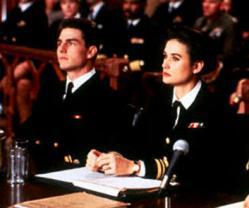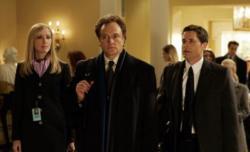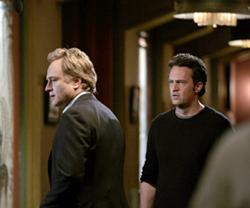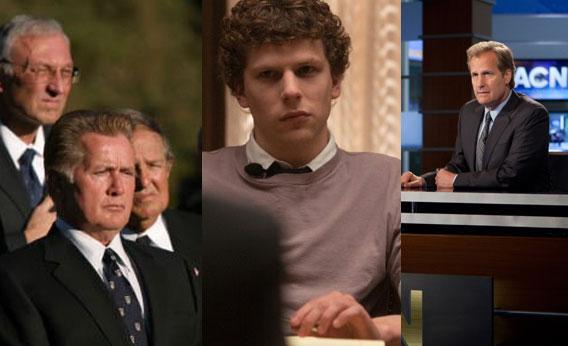In the first play Aaron Sorkin ever got produced, a one-act called Hidden in This Picture (1988), a director, a production manager, a screenwriter, and a P.A. bat around sassy banter while working on “a movie about disillusioned Marines in Guam playing war games that everyone in the industry knows is not going to make doo-dah at the box office,” as Reuben, the production manager, puts it. They’re making the movie on a farm in Schenectady, and preparing to film the final shot: sunset over a hill being traversed by soldiers. “This is an Academy Award-winning shot,” the director, Robert, says. He also says things like, “Call William Morris, find out who handles the sun, say we need a little favor.” The large star around which our planet revolves is being uncooperative.
What’s most notable about Hidden in This Picture is not that Aaron Sorkin, a quarter of a century ago, wrote exactly like Aaron Sorkin. Nor is it the already-present interest in backstage making-of stories, an interest that has since informed each one of Sorkin’s four TV series and a couple of his screenplays. Most notable are the repeated jabs at artistic pretension. Reuben keeps referring to the “Yale Drama crap” in the film script, and says that the writer “should’ve stayed in church basements in SoHo where if the audience doesn’t understand what the fuck is going on, they give him a plaque.” If you want “to be handed 17 million dollars to make a movie, with another 10 million to promote it,” he adds, “you better be pretty damn sure that someone in Des Moines is gonna buy a ticket.”
“Mr. Sorkin has some cutting remarks to make about the pretentiousness of the movie business,” declared Mel Gussow in the New York Times, “and, tangentially, the Off Off Broadway theater.” But that gets it backward. The man who is in the movie business, Reuben, is the closest thing the one-act has to a supposed voice of reason. It’s the auteurs and the Off Off Broadway types, with their “Yale Drama crap,” whom Sorkin really takes to task. Even when he was writing short plays for small crowds in Manhattan—Hidden in This Picture debuted at the West Bank Café Downstairs Theatre Bar (in, yes, the basement)—he was a proudly middlebrow writer who figured sensible people deserved smart, solid entertainment.
That Sorkin’s work is indeed middlebrow—is practically the definition of it—seems not to be universally understood. A profile by Dave Itzkoff published earlier this month in the New York Times, for instance, referred to Sorkin’s “willfully highbrow approach” to TV writing. But that’s probably more a comment on the general lowering of our collective brow than anything else. Sorkin would never, Franzen-like, claim to be part of a “high-art literary tradition.” If he aspires to belong to any literary tradition at all, it would seem to be the tradition of the Broadway musical, the most middlebrow genre there is. Seriously: In his new show, The Newsroom, Sorkin goes out of his way to mention a famous musical in every episode. Over the past few months, I’ve revisited everything Aaron Sorkin ever wrote, and I can say with certainty that the writers who get name-checked more than any other over the course of Sorkin’s considerable oeuvre are W.S. Gilbert and Arthur Sullivan. No one else comes close.
While lowbrow art indulges—sometimes brilliantly, sometimes with genius—our basic, gut-level pleasures, and highbrow art challenges (or attempts to challenge) our various preconceptions, middlebrow art provides an intelligent diversion that ultimately leaves things just as they were before. That doesn’t mean it can’t be extremely satisfying. Consider the most successfully Sorkinesque movie of all, A Few Good Men (1992), which was adapted from Sorkin’s first full-length play. In the 40 years since The Godfather—to pick a semiarbitrary dividing line—can you think of a more old-fashioned Hollywood film? Two hours and 18 minutes of close-ups on the beautiful faces of big movie stars making eloquent speeches in courtrooms and over drinks? The good guys win, the bad guys make terrific speeches, and “The End” actually appears in grand, white-letter script over the final frames! It may as well have been made in 1952.

Castle Rock Entertainment.
Which probably sounds dismissive. But in addition to being eminently watchable—and, more to the point, rewatchable—A Few Good Men is far from empty-headed. In fact, the movie resonates today in ways that have gone mostly uncommented upon (perhaps because, as much as everyone enjoys the movie, no one really takes it very seriously). In the movie’s climactic courtroom showdown, Jack Nicholson’s Colonel Jessup tells Tom Cruise’s Lieutenant Kaffee that he did, in fact, “order the Code Red,” which is to say he told an inferior officer to tell two Marines to beat up a third, underperforming Marine. (In the course of that beating, the underperforming Marine dies.) Such tactics are necessary, he says, to protect the nation, even in “peace time.” “All you did is weaken a country today,” Jessup tells Kaffee, after the latter rather implausibly and very dramatically pries a confession out of him. “That’s all you did.” Jessup is defending the torture of one of his own men, rather than the torture of the enemy, but the contours of the debate are familiar. And in the real-world debate, of course, the one that started about a decade after A Few Good Men came out (and continues today), Colonel Jessup is winning.
It wasn’t until that real-world debate hit the front pages that Sorkin would finally top his work in A Few Good Men. And that isn’t entirely a coincidence: As Mark Harris recently noted in New York Magazine, the higher the stakes, the better Sorkin’s work is. Which seems counterintuitive: Given the essential superficiality of his work—Sorkin has said many times that the “sound of intelligence” is what he loves, not the substance—one might expect lighter fare to be his forte. But when Sorkin does light, it’s usually awful. Witness The American President (1995), a decidedly Clinton-era, wannabe-Capra take on a widower president who starts dating a lobbyist. The movie—which, like A Few Good Men, was directed by Rob Reiner—is mostly bad, and occasionally creepy, like erotic White House fanfic written by a presidential biographer in his off hours. (“I’m sorry,” the president tells his girlfriend, “we’re going to have to cut our evening short. The Libyans have just bombed C-STAD. I’ll try to call you tomorrow.” Yuck.)

NBC Studios.
And yet The American President gave rise to The West Wing, possibly the best network drama ever made. (Sorkin used material cut from the movie for the TV series—and even some material he hadn’t cut from the movie.) What gets lost in all the much-deserved praise for the series is that the first season wasn’t that good. For a while, the show had the same problems with tone that dog The American President. After a fun pilot—Sorkin is great at pilots—The West Wing bumbled along with silly plots about Sam Seaborne (Rob Lowe), a senior staffer in the White House Communications Department, dating a call girl, and a Republican-prompted internal investigation into drug use among White House staffers.
But after the show’s fictional president, Josiah Bartlet (Martin Sheen), survives an assassination attempt in the Season 1 finale, The West Wing picks up some steam. And it really gets going in Season 3, the show’s first post-9/11 season, when the stakes are highest. The president is finally up for re-election, there’s a Congressional investigation into his relapsing-remitting MS—which he only disclosed well into his presidency—and reliable intelligence suggests that the Qumari defense minister is funding anti-American terrorism. (Qumar is a fictional Middle East nation that’s a bit like Saudi Arabia.) This time, it’s the good guys who decide, reluctantly, that the illegal use of force is necessary to protect the United States. “It’s wrong,” Bartlet say to Leo McGeary (Jon Spencer), his chief of staff, speaking of their plan to covertly assassinate Abdul Ibn Shareef, the Qumari defense minister. “It’s just wrong.” “I know,” Leo tells him, “but you have to do it anyway.” When the president asks why, Leo replies, “Because you won.”
The episode in which Leo delivers that line is a masterpiece of smart, middlebrow television art. President Bartlet gives the order to assassinate Shareef during a performance of The War of the Roses, a musical-theater version of Shakespeare’s Henry plays that Sorkin invented for the episode, borrowing a song from The Life and Adventures of Nicholas Nickleby with the chorus “And victorious in war shall be made glorious in peace.” The Henry plays harken back to a speech a couple of episodes earlier delivered by Admiral Fitzwallace, the chairman of the Joint Chiefs of Staff, in the situation room, about how modern war has nothing to do with what was waged at the Battle of Agincourt, when one “could tell between peace time and war time.” And the War of the Roses performance provides the setting for an accidental encounter between Bartlet and his Republican opponent in the upcoming election, a George W. Bush-like figure who replies to Bartlet’s news of the murder that night of a Secret Service member just a few blocks from the theater with the comment, “Crime … boy, I don’t know.” After a few testy words are exchanged, Bartlet tells him, “In the future, if you’re wondering, ‘Crime … boy, I don’t know’ is when I decided to kick your ass.”
I haven’t even mentioned the welfare reform bill that Deputy Chief of Staff Josh Lyman (Bradley Whitford) is trying to get passed while his girlfriend, Amy Gardner (Mary Louise Parker), the director of the fictional Women’s Leadership Coalition, tries to defeat it. (This effectively ends their relationship.) Or the continued search for the president’s new secretary, who has to replace a woman he’d known since childhood. Or the relationship between the president’s press secretary, C.J. Cregg (Allison Janney), and that murdered Secret Service agent. Each one of these storylines culminates in the last 10 minutes of the episode, which moves gracefully from one to the other. Will it change your life? No. But it will entertain you the first, second, third, and fourth times you sit down to watch it. (Really.)
It bears repeating that the series is just that: entertainment. The gravity of its situations lends the show dramatic force, not real-world application. The West Wing was never a substantive critique of American politics, and didn’t pretend to be. Rather, it gave us, to quote one critic, “an artificial world, with a neatly controlled and shapely precision which has not gone out of fashion—because it was never in fashion in the sense of using the fleeting conventions and ways of thought of contemporary human society.” The critic in this case was writing in 1957, and talking not about Sorkin but about Gilbert and Sullivan.
With The West Wing, Sorkin found the perfect vessel in which to pour line upon line of rhythmic argument, with real disputes among smart people who have important goals that butt up against serious obstacles. Those few things are nearly all that Sorkin needs to make compulsively watchable television. The last thing is a perfect cast. That may sound like the sort of thing every writer and director needs, but it’s true in a particular way for Sorkin, because he doesn’t really distinguish between his characters in any but the most superficial ways. (This may be why he likes to work with the same actors so often.) Apart from a verbal tic here or there, all his characters talk the same. When an interviewer asked him once about character development, Sorkin said, “When you say ‘character development,’ I don’t know what you mean. I feel like you’re talking about, do I grow their hair longer?” “There is no inside out,” he added. “I don’t sit there and think, ‘Oh shit, C.J. wouldn’t do this.’ C.J. would do whatever I make C.J. do.”
The characters on The West Wing are distinct because Janney, Spencer, Sheen, Lowe, Richard Schiff, et al., made them distinct. The perfect cast is also what saves Sports Night, Sorkin’s previous show, which otherwise never would have overcome the low stakes of its premise. (It’s about a SportsCenter-like program at a struggling network.) It helps that the each episode of that series is only 22 minutes long—not a ton of time for Sorkin to get all self-important, as he is wont to do. Sports Night ran for just two seasons, one of which overlapped with the first season of The West Wing; Sorkin, amazingly, was writing both shows at once. (Cocaine’s a hell of a drug. Sorkin reportedly quit using it in 2001.) He did recycle some of his favorite bits for both shows—a few of which he’d already put in a 1997 commencement speech, which he recently gave again. But the man’s never been afraid to go back to his best stuff. In The Newsroom pilot, news anchor Will McAvoy (Jeff Daniels) says there was a time when Americans “reached for the stars.” He is, presumably, referring to the second term of the Bartlet administration.

Mitch Haddad/NB.
Sorkin has gone back to the Sports Night well twice, first with Studio 60 on the Sunset Strip and now with The Newsroom. He hasn’t gotten it right yet. Studio 60 was a ludicrous effort to turn a Saturday Night Live-style sketch comedy show into America’s last best hope for a questioning, engaged citizenry. Its sketches were fatally unfunny, and by the end of its single season, one of the comedians was for some reason negotiating with terrorists in Afghanistan. (Something to do with a brother in the military, but really, don’t ask.) Four episodes in, The Newsroom might be worse. After a promising pilot—always with the promising pilot—the show goes downhill quickly, becoming more and more smug as McAvoy and his team start covering actual news stories from the recent past exactly as those of us living a couple years later wish they’d been covered.
Happily, even if The Newsroom never gets better, Sorkin will apparently keep writing movies about real-life figures, probably with the same commitment to good story and disregard for historical accuracy that has served his best recent biopics. He’s now working on a movie about Steve Jobs. When it comes out, someone will point out all the things it gets wrong about Jobs, just as they pointed out his errors regarding Mark Zuckerberg and Billy Beane. Faithfulness to history isn’t really Sorkin’s thing. (If you think The Social Network got things wrong—and it did—you should check out his play The Farnsworth Invention, which has inspired an entire website devoted to its inaccuracies.)
Of course, whether these movies are any good will have as much or more to do with their directors as with Sorkin. Film is mostly a director’s medium. The Social Network has some obvious Sorkin dialogue, and is structured like one of his morality tales—but Fincher works against the grain of the script, milking the tension between Sorkin’s moralizing take on Zuckerberg and his own more ambiguous, even admiring slant. Bennett Miller’s Moneyball has just enough of Sorkin’s storytelling drive to sustain what is ultimately a very un-Sorkin-like character study of a guy who sort of resembles Billy Beane. The biopic that preceded those, on the other hand, Charlie Wilson’s War, was totally bungled by Mike Nichols (and by the horrible casting of Tom Hanks and Julia Roberts).
If you want to watch Sorkin be Sorkin, TV will always be the place to do it. So one hopes that after a season or two of The Newsroom, he will finally get this backstage TV obsession out of his system and write a show about lawyers. No one can make a deposition dramatic like Aaron Sorkin. Recall that all of The Social Network, in reality, is one long deposition; even in his one thriller, Malice, a deposition provides the most riveting scene. Lawyers, not TV producers, are the perfect Sorkin subjects, since they argue for a living and often have to repeat things. The stakes in a courtroom are often high—and can be grasped instantly. (When making a TV show about lawyers, one needn’t pretend that a TV show will save America.) Such a series wouldn’t reinvent television, or anything else, but it would almost certainly divert us for an hour each week with the entertaining sound of intelligence.
